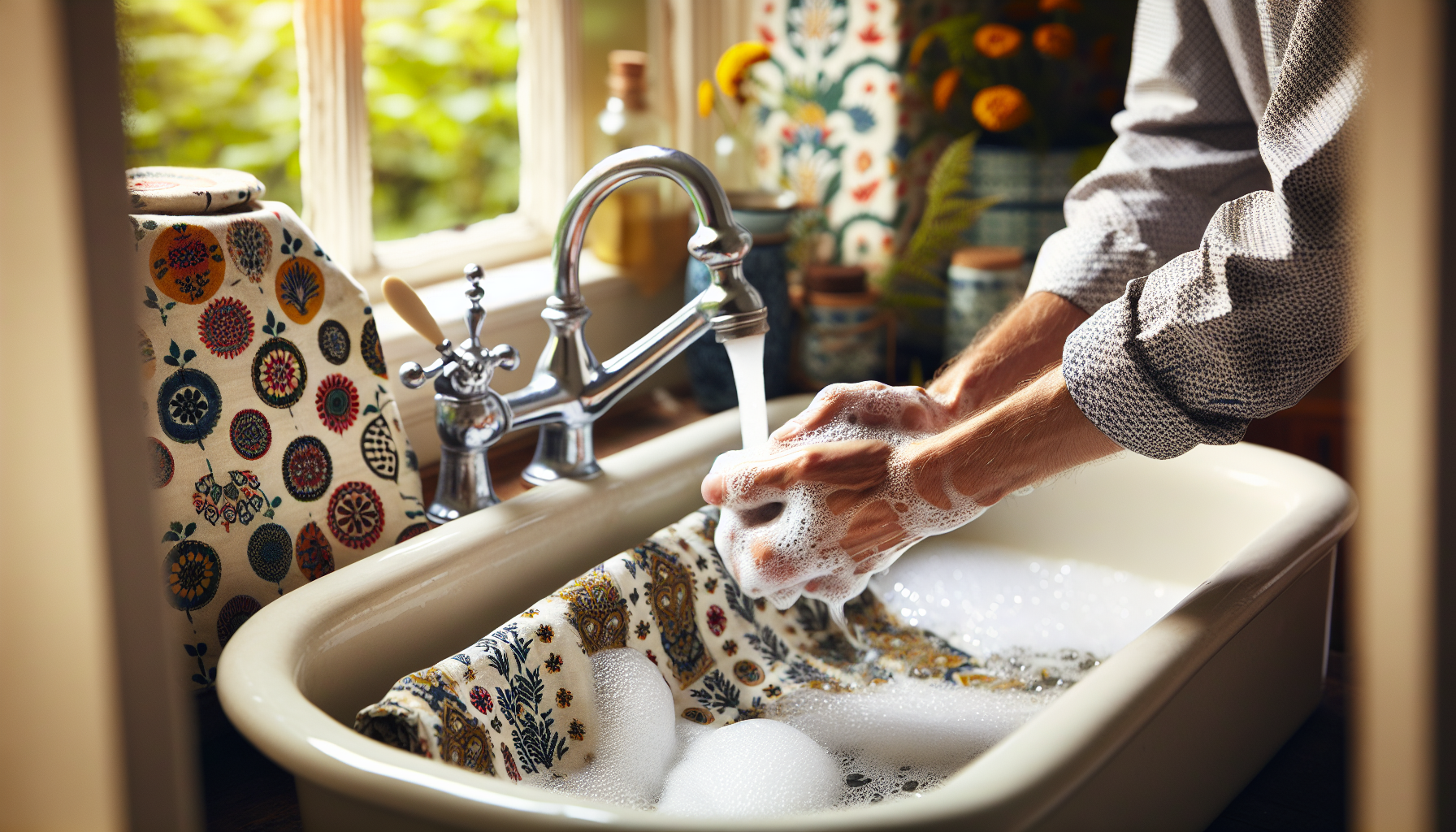How do you wash kitchen towels? You can wash kitchen towels by separating them from other laundry, using hot water and a strong detergent, and adding a disinfectant like bleach or vinegar. Read on to learn the best practices for kitchen towel cleaning, sanitizing, and stain removal.
Kitchen towels are the real heroes of the kitchen. You use them for everything—wiping up spills, drying dishes, and sometimes even grabbing hot pans. Since they get used so much, they tend to collect grease, stains, and bad smells pretty fast. Cleaning them the right way is a must for keeping your kitchen healthy. This guide gives you all the laundry tips you need to keep your towels fresh, clean, and ready for action.

Image Source: images.surferseo.art
The Importance of Regular Kitchen Towel Cleaning
Washing frequently used towels is more than just about keeping them looking nice. It’s essential for hygiene.
- Preventing Bacteria Growth: Damp kitchen towels are breeding grounds for bacteria like E. coli and Salmonella.
- Avoiding Cross-Contamination: Using a dirty towel can spread germs from raw meat to clean surfaces or dishes.
- Eliminating Unpleasant Odors: Lingering food particles cause towels to smell musty or sour.
Preparing Kitchen Towels for Washing
Before you throw your kitchen towels into the washing machine, follow these steps for better results:
Sorting Your Towels
Always separate your kitchen towels from other laundry. This prevents transferring food stains and bacteria to your clothes or other household linens. Keep cleaning dish towels separate to prevent cross-contamination.
Pre-Treating Stains
Act fast when dealing with stains. The sooner you treat them, the easier they are to remove.
- Grease Stains: Apply dish soap directly to the stain. Let it sit for 15-20 minutes before washing.
- Food Stains: Rinse the stain with cold water. Then, rub with a stain remover stick or liquid.
- Tough Stains: For stubborn stains, make a paste of baking soda and water. Apply it to the stain and let it sit for a few hours before washing.
Dealing with Odors
If your towels have a lingering odor, soak them in a solution of water and vinegar before washing.
- Fill a tub or sink with hot water.
- Add 1 cup of white vinegar.
- Soak the towels for at least 30 minutes, or even overnight for really bad odors.
The Best Way to Wash Kitchen Towels
Now that your towels are sorted, pre-treated, and soaked (if needed), it’s time to wash them. Follow these guidelines for the best way to wash kitchen towels:
Choosing the Right Water Temperature
Hot water is the most effective for killing bacteria and removing stains. Always wash kitchen towels in hot water.
Selecting the Proper Detergent
Use a high-quality laundry detergent with enzymes. Enzymes help break down food particles and stains.
Adding Disinfectant
For sanitizing kitchen towels, consider adding a disinfectant to your wash.
- Bleach: Bleach is a powerful disinfectant. Add 1/2 cup of chlorine bleach to your washing machine’s bleach dispenser. Note: Only use bleach on white towels to avoid discoloration.
- Vinegar: White vinegar is a natural disinfectant and odor remover. Add 1 cup to the washing machine’s fabric softener dispenser.
- Laundry Sanitizer: Follow the product instructions.
Washing Cycle
Select a heavy-duty or sanitary cycle on your washing machine. These cycles use hotter water and longer wash times for optimal cleaning.
Loading the Washing Machine
Avoid overloading the washing machine. Too many towels can prevent proper cleaning and rinsing.
Drying Your Kitchen Towels
Proper drying is just as important as washing.
- High Heat: Tumble dry your kitchen towels on high heat to kill any remaining bacteria.
- Check for Lingering Stains or Odors: Before folding and storing, make sure the towels are completely clean and fresh. If not, rewash them.
Washing Kitchen Towels with Bleach: A Cautious Approach
Washing kitchen towels with bleach is an effective way to disinfect and brighten white towels. However, it’s important to use bleach safely and correctly.
When to Use Bleach
Use bleach when dealing with heavily soiled or stained white towels, or when you want extra sanitization.
How to Use Bleach Safely
- Dilute Bleach: Always dilute bleach before adding it to the washing machine.
- Use the Bleach Dispenser: Pour the diluted bleach into the washing machine’s bleach dispenser.
- Avoid Mixing with Other Cleaners: Never mix bleach with ammonia or other cleaning products. This can create dangerous fumes.
- Ventilate the Area: Make sure the laundry area is well-ventilated.
Alternatives to Bleach
If you’re concerned about using bleach, consider these alternatives:
- Vinegar: As mentioned earlier, vinegar is a natural disinfectant and odor remover.
- Hydrogen Peroxide: Hydrogen peroxide is a mild bleaching agent that can help brighten white towels. Add 1 cup to the washing machine.
- Oxygen Bleach: Oxygen bleach is a color-safe alternative to chlorine bleach. It’s effective for removing stains and brightening colors.
Specific Scenarios and Solutions
Different kitchen scenarios might require tailored cleaning methods.
Removing Mold and Mildew
If your towels have mold or mildew, take these steps:
- Pre-soak: Soak the towels in a solution of hot water and bleach for at least an hour. Use bleach only on white towels.
- Wash: Wash the towels in hot water with detergent and bleach.
- Dry: Dry the towels on high heat.
Dealing with Burnt Food Smells
Burnt food smells can be tough to get rid of. Try these tips:
- Pre-soak: Soak the towels in a solution of hot water and baking soda overnight.
- Wash: Wash the towels in hot water with detergent and vinegar.
- Dry: Dry the towels on high heat.
Addressing Grease Buildup
Grease buildup can make towels feel sticky and grimy.
- Pre-treat: Apply dish soap directly to the greasy areas.
- Wash: Wash the towels in hot water with detergent and borax. Borax helps break down grease.
- Dry: Dry the towels on high heat.
Kitchen Towel Laundry Tips for Maintaining Freshness
These kitchen towel laundry tips will help you keep your towels fresh and clean.
Washing Frequently Used Towels
Wash your kitchen towels every 1-2 days. If you use them heavily, wash them daily.
Rotating Your Towels
Have a good supply of kitchen towels so you can rotate them regularly. This prevents any one towel from becoming too dirty or worn.
Proper Storage
Store clean, dry towels in a well-ventilated area. Avoid storing them in damp or humid places, which can promote mold growth.
Sun Drying
Whenever possible, dry your towels outside in the sun. Sunlight is a natural disinfectant and helps to brighten white towels.
Avoiding Fabric Softener
Avoid using fabric softener on kitchen towels. Fabric softener can reduce the absorbency of the towels.
Other Useful Tips for Kitchen Towel Cleaning
These extra suggestions will help your kitchen towel cleaning routine.
Use Separate Towels for Different Tasks
Use separate towels for drying dishes, wiping counters, and handling raw meat. This reduces the risk of cross-contamination.
Designate Towel Usage
Assign specific towel colors or patterns to specific tasks to avoid cross-contamination.
Hang Towels to Dry Properly
Always hang towels to dry completely after each use. This prevents the growth of bacteria and odors.
Consider Paper Towels for Certain Tasks
For tasks involving raw meat or heavy spills, consider using paper towels instead of cloth towels.
Regularly Clean Your Washing Machine
A clean washing machine ensures that your towels are getting as clean as possible. Run an empty washing machine cycle with hot water and bleach every month.
Deciphering Different Types of Kitchen Towels & Their Care
Different types of kitchen towels may require slightly different care.
| Type of Towel | Material | Washing Instructions | Special Considerations |
|---|---|---|---|
| Cotton Dish Towels | 100% Cotton | Hot water, strong detergent, tumble dry high. | Prone to shrinking. |
| Linen Kitchen Towels | 100% Linen | Warm or hot water, mild detergent, tumble dry low or line dry. | Linen becomes softer with each wash. |
| Microfiber Towels | Polyester/Polyamide | Warm water, mild detergent, tumble dry low. | Avoid fabric softener, as it can reduce absorbency. |
| Terry Cloth Towels | Cotton Blend | Hot water, strong detergent, tumble dry high. | Tend to hold onto odors. |
| Flour Sack Towels | Lightweight Cotton | Warm or hot water, gentle detergent, tumble dry low or line dry. | Known for being lint-free. |
Frequently Asked Questions (FAQ)
Can I wash kitchen towels with other clothes? No, it’s best to wash kitchen towels separately to prevent cross-contamination.
How often should I wash my kitchen towels? Wash them every 1-2 days, or daily if you use them heavily.
What temperature should I wash kitchen towels at? Always wash them in hot water to kill bacteria and remove stains.
Is it safe to use bleach on kitchen towels? Yes, bleach is safe for white towels. Always dilute it and follow safety precautions. Avoid using it on colored towels to prevent fading.
What can I use instead of bleach? Vinegar, hydrogen peroxide, and oxygen bleach are good alternatives.
How do I get rid of stubborn stains on kitchen towels? Pre-treat stains with dish soap, stain remover, or a paste of baking soda and water.
Why do my kitchen towels smell even after washing? This is often due to bacteria buildup. Try soaking them in vinegar before washing.
How can I keep my kitchen towels fresh? Wash them regularly, rotate them, store them properly, and hang them to dry after each use.
Are microfiber towels good for kitchen use? Yes, they are very absorbent and quick-drying.
By following these comprehensive guidelines, you can maintain clean, fresh, and hygienic kitchen towels. This will not only improve the look and feel of your kitchen but also help prevent the spread of germs and bacteria, ensuring a healthier home.

Hi, I’m Larry Fish, the mind behind MyGrinderGuide.com.. With a passion for all things kitchen appliances, I created this blog to share my hands-on experience and expert knowledge. Whether it’s helping you choose the right tools for your culinary adventures or offering tips to make your kitchen more efficient, I’m here to guide you. My goal is to make your time in the kitchen not only easier but also enjoyable! Welcome to my world of kitchen mastery!
